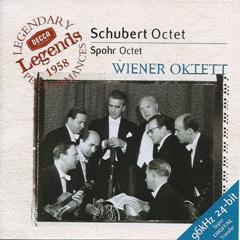Franz Schubert – Oktett F-dur D803 (2000)
Franz Schubert – Oktett F-dur D803 (2000)

[01] I. Adagio - Allegro 11:57 [02] II. Adagio 9:54 [03] III. Allegro vivace 5:57 [04] IV. Andante 11:23 [05] V. Menuetto: Allegretto 5:31 [06] VI. Andante molto - Allegro 8:25 Wiener Oktett : Willi Boskovsky violin I - Philipp Matheis violin II Günther Breitenbach viola - Nikolaus Hübner cello Johann Krump double bass - Alfred Boskovsky clarinet Josef Veleba horn - Rudolf Hanzl bassoon Recorded: March 1958, Sofiensaal, Vienna
Octet for clarinet, horn, bassoon & strings in F major, D. 803 (Op. posth. 166).
By his own account, Franz Schubert set about composing his Octet in F major for winds and strings, D. 803, in 1824 as a means of preparing himself for the task, planned for the near future (and realized in the Great Symphony in C major), of composing a full-scale symphonic work. It was not the first time Schubert had done such preparatory work before proceeding to a full-scale symphony. More than a decade earlier, he had written sections of an all-wind Octet, D. 72 and D. 72a, before moving on to complete his very first symphony. However, in 1824 Schubert felt he was more or less starting from scratch as a symphonist. He had relatively little regard for the six symphonies of his youth and did not even include the unfinished symphonies of 1821 and 1822 in his mental catalog of works. And so, the Octet in F is a significant endeavor of self-betterment, as well as a wonderful chamber music achievement. The work was finished on the first day of March 1824.
Schubert opted to draw on Beethoven when composing the Octet, specifically Beethoven's Septet, Op. 20 of 1799-1800. Beethoven's work is in six movements, as is Schubert's. Beethoven's work is scored for clarinet, horn, bassoon, string trio, and contrabass; Schubert's for clarinet, horn, bassoon, string quartet, and contrabass. The choice was an apt one: Beethoven wrote his Septet as preparation for composing his Symphony No. 1.
The first movement opens with an 18-measure Adagio introduction that sets up the basic dotted-rhythm gesture (now reaching up, now reaching down) around which the Allegro body of the movement is built. The eight players should relish this zestful recollection of Mozart at his most exuberant. The second movement is an Adagio in B flat major with a silver-lined melody for the clarinet -- not surprising since the Octet was commissioned by a clarinetist. The third movement is a scherzo and trio in all but name, the fourth a set of seven variations on a theme taken from Schubert's own Die Freunde von Salamanka, D. 326 (1815). The fifth movement is a minuet and trio, this time in name as well as gesture and shape. The final movement's lighthearted walking-bass (or perhaps running-bass, as it is Allegro) and boisterous alla breve tune are prefaced by a slow(ish) introduction of about the same proportions as the first movement's introduction. The Octet's final bars are ones of jubilant delight. ---Blair Johnston, Rovi
download: uploaded yandex 4shared mediafire solidfiles mega zalivalka filecloudio anonfiles oboom
Last Updated (Monday, 28 April 2014 17:06)








